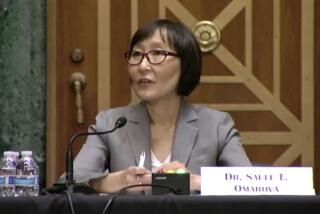Daschle made the right call
- Share via
Embarrassing disclosures about unpaid taxes forced the withdrawal Tuesday of two of President Obama’s nominees: Nancy Killefer, who was to be the White House’s chief performance officer, and Tom Daschle, Obama’s pick for secretary of Health and Human Services. These breakdowns were hard to ignore, especially in the wake of new Treasury Secretary Timothy F. Geithner’s failure to pay thousands of dollars worth of payroll taxes.
Is it really so difficult to find appointees who pay their taxes in full like ordinary citizens? Killefer evidently failed to pay some “nanny taxes,” leading to a $950 dispute with the District of Columbia. Daschle, meanwhile, neglected to report three years’ worth of perks, and ultimately paid more than $140,000 in back taxes and interest after he was nominated.
When the first reports about Geithner’s tax problems emerged, we said we’d give him the benefit of the doubt in the hope that he’d lead the fight for a simpler tax code. Our confidence in him subsequently was strained when he admitted that his employer had reminded him repeatedly to pay those taxes. Nevertheless, with the economy in a nose dive and the banking industry teetering, Geithner’s previous experience at the Treasury Department and the Federal Reserve Bank of New York outweighed his tax problems. Similarly, Killefer’s expertise in public-sector management seemed a good fit for the job of eliminating programs that don’t work.
The problem with Daschle’s nomination, though, went beyond his tax returns. After losing his reelection bid in 2004, Daschle, the former leader of the Senate Democrats, spent four years doing what many former officeholders do: cashing in on his connections. He collected more than $2 million from a D.C. law firm as a “special policy advisor” -- not bad for someone with no law degree. A major Democratic Party donor paid him more than $2 million too, as well as providing $255,000 worth of limousine service. Daschle also received rich speaking fees from lobbyists and others in the healthcare industry in the last two years. In other words, he traded on his Washington ties to a much greater degree than Geithner or Killefer appear to have done.
Daschle’s supporters argued that his knowledge of the inner workings of the healthcare industry and Washington made him an ideal choice to lead Obama’s push for fundamental changes in the U.S. approach to health insurance. That’s a common defense for an embattled nominee or officeholder: Although insiders may bring with them some conflicts and the occasional impropriety, that’s somehow acceptable because they can get things done.
But it’s not acceptable, and we welcome Daschle’s decision to withdraw. Many in Washington’s political class have shown a disturbing indifference toward conflicts of interest. Obama seemed to recognize this when he announced, on his first full day in office, a strict ethics code that took aim at the capital’s revolving door. Obama, who acknowledged Tuesday that he’d “screwed up” by backing Daschle, was right to insist on tougher standards, wrong to nominate a Cabinet officer whose conduct undermined them.
More to Read
A cure for the common opinion
Get thought-provoking perspectives with our weekly newsletter.
You may occasionally receive promotional content from the Los Angeles Times.










